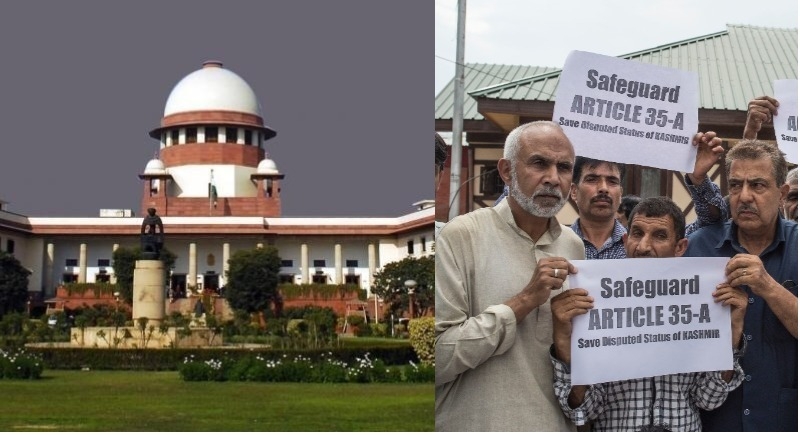SC to hear on petitions challenging validity of Article 35A from last week of August
New Delhi, August 6: The Supreme Court (SC) on Monday morning adjourned the crucial hearing on petitions challenging the validity of Article 35A, a constitutional provision that defines special privileges enjoyed by permanent residents of Jammu Kashmir in matters related to employment, acquisition of immovable property, settlements and scholarships.

Notably, the four petitions clubbed with the main plea Article 35 A will now be heard in week commencing August 27. The hearing was adjourned as Justice D Y Chandrachud, one of three judges in the bench, was not present and on the grounds of the upcoming elections to local bodies.
The matter was initially listed for hearing before a bench comprising CJI Dipak Misra and Justices A M Khanwilkar and D Y Chandrachud. The three-judge bench was hearing the case to decide whether issue of Article 35A has to be referred to a constitutional bench. "We will only have to see whether Article 35 A goes against basic structure of Constitution," the Supreme Court said.
A total of four petitions, three clubbed with the main plea filed by non-government organization We The Citizens, have challenged the legality of the law on the grounds that it was implemented on the President's orders in 1954 without being presented before Parliament.
Meanwhile, protests, shut down in Kashmir over the issue of Article 35A continues in the valley. Kashmir’s stability, peace, safety and security mainly gets in danger after a terror attack, stone pelting incident or during counter terrorist operations. But this time stability of the valley is at stake due to Article 35-A, a constitutional provision that defines special privileges enjoyed by permanent residents of Jammu Kashmir in matters related to employment, acquisition of immovable property, settlements and scholarships.
Let’s understand what is Article 35-A and why it is important for Kashmir.
Article 35A of the Indian Constitution is an article that empowers the Jammu and Kashmir state's legislature to define “permanent residents” of the state and provide special rights and privileges to those permanent residents. It is added to the Constitution through a Presidential Order, i.e., The Constitution (Application to Jammu and Kashmir) Order, 1954 - issued by the President of India, "in exercise of the powers conferred by" clause (1) of Article 370 of the Constitution, with the concurrence of the Government of the State of Jammu and Kashmir.
The Constitution (Application to Jammu and Kashmir) Order, 1954 was issued by President Rajendra Prasad under Article 370, with the advice of the Union Government headed by Jawaharlal Nehru. It was a subsequent to the '1952 Delhi agreement', reached between Jawaharlal Nehru and the then Prime Minister of Jammu and Kashmir Sheikh Abdullah, which dealt with the extension of Indian citizenship to the Jammu and Kashmir "state subjects".
Article 35 A states that "Saving of laws with respect to permanent residents and their rights. — Notwithstanding anything contained in this Constitution, no existing law in force in the State of Jammu and Kashmir, and no law hereafter enacted by the Legislature of the State:
(a) defining the classes of persons who are, or shall be, permanent residents of the State of Jammu and Kashmir; or
(b) conferring on such permanent residents any special rights and privileges or imposing upon other persons any restrictions as respects—
(i) employment under the State Government;
(ii) acquisition of immovable property in the State;
(iii) settlement in the State; or
(iv) right to scholarships and such other forms of aid as the State Government may provide, shall be void on the ground that it is inconsistent with or takes away or abridges any rights conferred on the other citizens of India by any provision of this part."